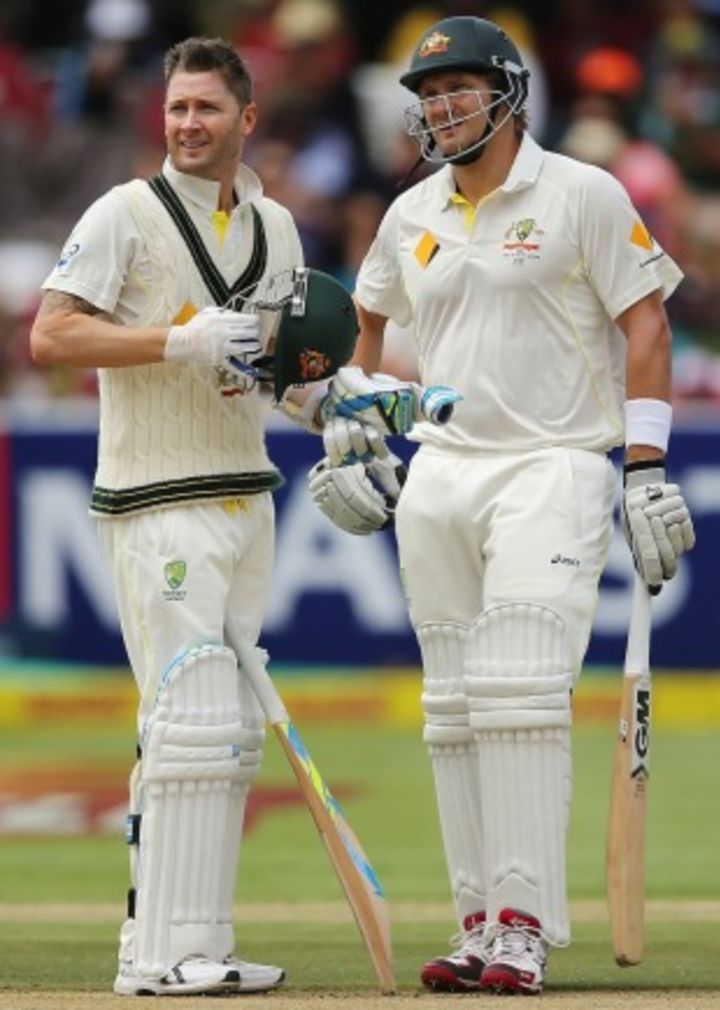Resilient Australia close to becoming a powerhouse
They have the aggressive opening bowler and batsman and the imaginative captain to become unbeatable. The No. 3 slot is the only chink in their armour
Australia have surged on a tidal wave towards the top of the Test rankings and they possess some attributes that will make it difficult for opponents to stop that momentum.
Michael Clarke said before the series that his attack was stronger than a very capable South African line-up, and in the end he was proved right. That's one reason Australia are surging: a superb fast-bowling attack headed by the pace and aggression of Mitchell Johnson.
The captain himself is another plus. Clarke has been far ahead of his opposition this summer - Alastair Cook and Graeme Smith - but he's also a superior Test skipper to all the others, with his only challenger being the aggressively like-minded Brendon McCullum. Unfortunately for McCullum, New Zealand aren't blessed with the talent of Australia.
The other advantage Australia have over the contenders is David Warner. An explosively aggressive opener provides an enormous windfall for his team, with the main prize being that the opposition are wary before he has even faced a ball. Warner is now more consistent, has a thirst for centuries, and has cleared his mind of the clutter that can stunt the growth of an aggressive batsman. As long as Warner is performing, the chinks in Australia's batting armour are less likely to be exposed. The fact that Steven Smith has also matured into a consistent performer means Australia's batting suddenly has fewer weaknesses than when the Ashes series started.
However, No. 3 is still a black hole and this will become more apparent if Warner's form recedes. Australia won't become a real powerhouse until they can unearth a dominant No. 3, and there doesn't appear to be one with the potential in the pipeline.

As the summer progressed, it became patently clear that conservative captaincy wouldn't halt the runaway train that is Australia, with Johnson spearheading a penetrative attack, complemented by Clarke's imaginative captaincy. It's a tough combination to beat; an aggressive captain with the wherewithal to implement an attacking strategy from the opening delivery of each Test. The other major Test nations must be concerned, because Australia's style of play is suited not just to home conditions but also to those in South Africa and, to a lesser extent, England.
Having confirmed this by defeating South Africa in their own conditions, Australia have completed a rare recent feat among Test nations - they have won away from home. Their confidence will be further boosted by the stream of young fast bowlers waiting in the wings; James Pattinson, Mitchell Starc and Pat Cummins provide hope that the pace bowling edge can be maintained.
The team with the best chance of unsettling Australia are India, at home, where the conditions suit spinners and also help defuse pace bowlers. Not only is Australia's pace-bowling advantage blunted but their batting is also most susceptible when the ball is turning consistently.
As Australia look to build on the momentum gained during the summer, it will be interesting to see how Shane Watson adjusts to being an allrounder, batting in the No. 6 slot. If it works well he'll bring some distinct advantages. Watson gives the frontline quicks a breather by delivering a few overs of tidy medium pace, and if Australia get into a strong position he can batter the opposition into submission with his adventurous strokeplay.
However, if the hole at No. 3 can't be satisfactorily filled he may be deployed there in an attempt to plug the gap. I suspect Clarke will resist this move as long as possible, as he prefers Watson to fulfil the role of the allrounder. Compared to the major headaches Australia had just a few months ago, these are just minor irritations.
Once again Australian cricket has displayed tremendous resilience. It's a strength based on aggressive play, good fast bowling and imaginative captaincy. It has been a productive formula over time, and fortunately for Australia the other major Test nations not only find it difficult to counter but also to emulate.
Former Australia captain Ian Chappell is now a cricket commentator for Channel 9, and a columnist
Read in App
Elevate your reading experience on ESPNcricinfo App.